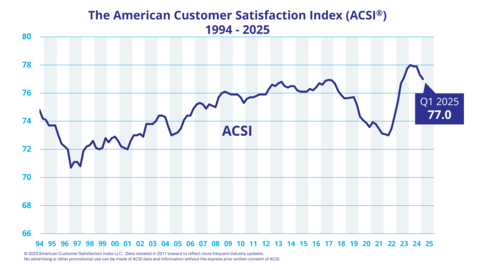Q1 2025: The American Customer Satisfaction Index (ACSI)
American Customer Satisfaction Index:
This press release features multimedia. View the full release here: https://www.businesswire.com/news/home/20250513205944/en/

ACSI 1994-2025
| The American Customer Satisfaction Index was developed at the University of Michigan by a prominent group of scientists under the leadership of Claes Fornell, the Distinguished Donald C. Cook Professor of Business (Emeritus). Dr. Fornell is a world-leading scholar in multivariate statistical models with latent variables and in customer satisfaction measurement and analysis. The group includes former University of Michigan faculty, Michael D. Johnson, now Professor and Marketing Department Chair, University of Wisconsin, and Gene Anderson, now Dean of the Pittsburgh School of Business. Important research contributions were also provided by David F. Larcker, the James Irvin Miller Professor of Accounting at Stanford University, and former University of Michigan faculty, Birger Wernerfelt, now the JC Penney Professor of Management at MIT. Due to the commercial applicability of ACSI, the University of Michigan’s Technology Transfer Unit later shifted its ownership to its developer, Dr. Fornell. |
As the gross domestic product (GDP) contracted and consumer sentiment fell, overall U.S. customer satisfaction declined 0.4% in the first quarter of 2025 to a score of 77.0 (on a scale of 0 to 100), according to the American Customer Satisfaction Index (ACSI®). The Index has remained flat or dropped in four consecutive quarters — something that hasn’t occurred since the COVID-19 crisis. It is now down 1.3% for the past year, led by slumps for the U.S. Postal Service, cell phones, and apparel.
ACSI measures quality of economic output (relative to price). GDP tracks quantity of economic output. These two statistics often move together, but not always. This time, both are negative, but their current relationship is spurious. GDP contracted due to a major surge in imports from inventory stockpiling, triggered by a threat of higher tariffs. Customer satisfaction is of no relevance in that context but has declined due to price increases and inconsistent service quality.
Weakening customer satisfaction has a negative effect on demand. Strengthening the buyer-seller relationship is important because it leads to exponentially increasing profits — especially at high levels of customer retention — and much improved cash flow stability. This is especially relevant in industries where customer satisfaction elasticity of demand is high, such as subscription TV, credit unions, internet service providers, banks, wireless phone services, and financial advisors, but less so for supermarkets, gas stations, and social media. The U.S. Postal Service, cell phones, apparel, and online investment companies are among those that declined the most in customer satisfaction over the past year and also most at risk for revenue growth uncertainty.
“The general lack of strong business-customer relationships in the U.S. is problematic,” said Claes Fornell, founder of the ACSI and the Distinguished Donald C. Cook Professor (Emeritus) of Business Administration at the University of Michigan. “Customer satisfaction has not improved substantially over the past 12 years, despite vast corporate investments to do just that. Extrapolating the ACSI trajectory from the first decade of this century, customer satisfaction would be almost 6% higher than it is today and there would be much higher customer loyalty to boot. There is no evidence that inflated consumer expectations are to blame: The expectations-satisfaction gap has remained fairly constant over time. The problem lies in poor performance metrics and data analytics.”
The metrics generally fail in separating data noise from information. The data analytics are ill-suited for the many idiosyncrasies in customer data, making resource allocation for improving customer relationships more difficult. While analytical rigor and science-based measurement instruments are often absent, they are necessary for realizing the financial benefits from strong customer relationships: high returns/low risk.
For more, follow the American Customer Satisfaction Index on LinkedIn and X at @theACSI or visit www.theacsi.org.
No advertising or other promotional use can be made of the data and information in this release without the express prior written consent of ACSI LLC.
About the ACSI
The American Customer Satisfaction Index (ACSI®) has been a national economic indicator for over 25 years. It measures and analyzes customer satisfaction with approximately 400 companies in about 40 industries and 10 economic sectors, including various services of federal and local government agencies. Reported on a scale of 0 to 100, scores are based on data from interviews with roughly 200,000 responses annually. For more information, visit www.theacsi.org.
ACSI and its logo are Registered Marks of American Customer Satisfaction Index LLC.
View source version on businesswire.com: https://www.businesswire.com/news/home/20250513205944/en/
Contacts
FOR MORE INFORMATION
Christian Rizzo
christian@gregoryfca.com




